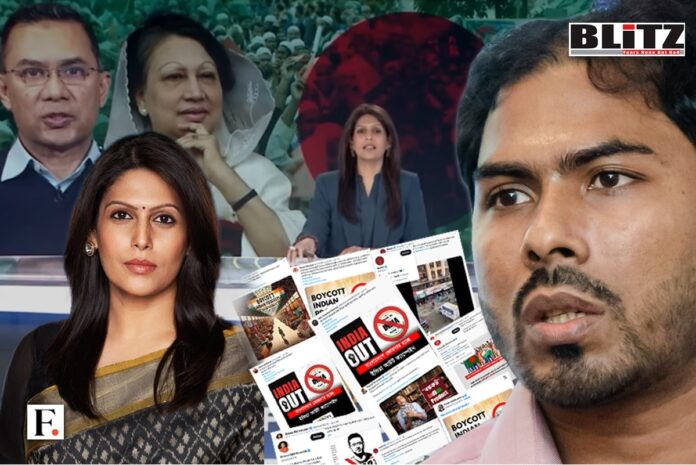Eminent Indian journalist Palki Sharma and several Indian news outlets including Zee News, India TV, ABP Live, Aaj Tak, News 18 India, Republic Bharat, TV9 Bharatvarsh, Oneindia Hindi, Times Now, Navbharat and others are being targeted by Dhaka’s leading English newspaper The Daily Star and its contributor – Qadaruddin Shishir, who reportedly is connected to Jamaat-e-Islami for publishing reports on ultra-Islamist and Al Qaeda-connected Bangladesh Nationalist Party (BNP)’s recently launched “India Out” activities.
It may be mentioned here that, following publication of a breaking story in Blitz exposing BNP’s notorious bids against India, a large number of Indian media outlets, including the Firstpost came up with reports on this issue. As the news is continuing to spread further, while BNP men are intensifying their propaganda on social media sites inciting anti-India sentiment, The Daily Star on February 1, 2024 came up with an op-ed penned by Jamaat member Qadarudding Shishir who is employed by French news agency AFP and factchecker.
In the era of rapid information dissemination and diverse media platforms, navigating the landscape of conflicting narratives becomes increasingly challenging. The recent controversy surrounding the “India Out” campaign in Bangladesh, as dissected in a video by Firstpost, has sparked a vigorous debate marked by conflicting perspectives. This article aims to critically analyze a counter-article penned by Qadaruddin Shishir for The Daily Star, delving into the intricacies of media analysis, fact-checking, and potential biases that have emerged in the wake of this controversy.
Shishir’s central assessment revolves around a video published by Firstpost, investigating the alleged “India Out” movement in Bangladesh and implicating the Bangladesh Nationalist Party (BNP) and its acting chairperson, Tarique Rahman. Qadaruddin Shishir questions the legitimacy of the claims made in the video, arguing that Palki Sharma fails to provide specific evidence. However, it is essential to recognize the challenges inherent in uncovering evidence in a politically charged environment. The covert nature of such activities makes concrete evidence hard to obtain, requiring a nuanced understanding of the information landscape.
Shishir’s demand for explicit proof overlooks the subtleties of political maneuvering, where concrete evidence might be challenging to secure due to the covert nature of such activities. The article emphasizes the need to recognize the nuances of the information landscape, acknowledging the potential impact of disinformation campaigns that can obscure the truth.
Qadaruddin Shishir raises doubts about the timing and intent of Indian media’s coverage compared to Bangladeshi media’s apparent lack of attention to the alleged campaign. While this prompts legitimate questions, Shishir’s focus on this aspect neglects the broader context of disinformation mechanisms and the potential manipulation of narratives. The orchestrated spread of false information is a documented phenomenon, requiring careful consideration in evaluating the credibility of media coverage.
The fact-checker challenges the credibility of Jennifer Hicks, the author of the EurAsian Times article that played a pivotal role in propagating the narrative. Shishir questions Jennifer Hicks’ credentials without delving into the substance of the information presented in her article, introducing an element of personal bias into the evaluation. This ad hominem approach detracts from a rigorous analysis of the facts, emphasizing the need for impartial scrutiny.
Shishir’s article also draws attention to the fact that Indian channels were the first to report on #IndiaOut and #BoycottIndianProducts. He queries why the issue was initially avoided by the media in Bangladesh, citing Blitz as the first to publish a report on January 12, providing evidence of BNP and Jamaat involvement in the campaign.
Interestingly, Shishir’s article takes a critical stance on Jennifer Hicks and Blitz editor Salah Uddin Shoaib Choudhury, questioning the objectivity of their reporting. Shishir appears unaware of BLitz’s status as a registered newspaper, dismissing it as a mere website and raising concerns about his effectiveness as a fact-checker.
Shishir’s lack of awareness about Weekly Blitz’s status as a 21-year-old registered newspaper in Bangladesh underscores potential gaps in his understanding of the media landscape. This lack of awareness raises questions about the thoroughness of his fact-checking process, as understanding the context and legitimacy of sources is fundamental to evaluating the veracity of information.
Shishir’s background includes references to his past as a supporter of Jamaat-e-Islami (JeI) and also as a worker of Chhatra Shibir, hinting at a potential bias in his fact-checking endeavors. Accusations have been made that he might be attempting to conceal the involvement of the BNP and Tarique Rahman, insinuating a hidden agenda. The article asserts that individuals associated with Jamaat are actively working to protect the BNP’s reputation.
While fact-checking serves as a crucial pillar in upholding journalistic integrity, it is equally important for fact-checkers to approach their analyses with impartiality, thoroughness, and a commitment to uncovering the truth. Shishir’s article appears to exhibit biases that compromise the objectivity of his critique. As consumers of information, it is incumbent upon us to engage critically, recognizing the need for a balanced and comprehensive understanding of complex issues such as the alleged “India Out” campaign in Bangladesh. The controversy underscores the challenges of discerning truth in an era where narratives are shaped, questioned, and contested across various media platforms.





International media needs to investigate Bangladesh Nationalist Party, as it already is known as ultra-Islamist force while is also accused of having connections with Al-Qaeda.
AFP needs to immediately sack this terrorist from its employment. Why France should employ a person who is inclined towards Al Qaeda and jihad?
Shocking! How French news agency AFP is still having this pro-jihad Al Qaeda man in employment? Western media needs to cover this issue.
French news agency AFP needs to investigate this matter and take action against this jihadis employee.
AFP needs to immediately terminate contract with this jihadi man.